Biobased PEF Antiviral Battery 11-11-2021 - Arhive
Biobased PEF Antiviral Battery
Crude Oil Prices Trend
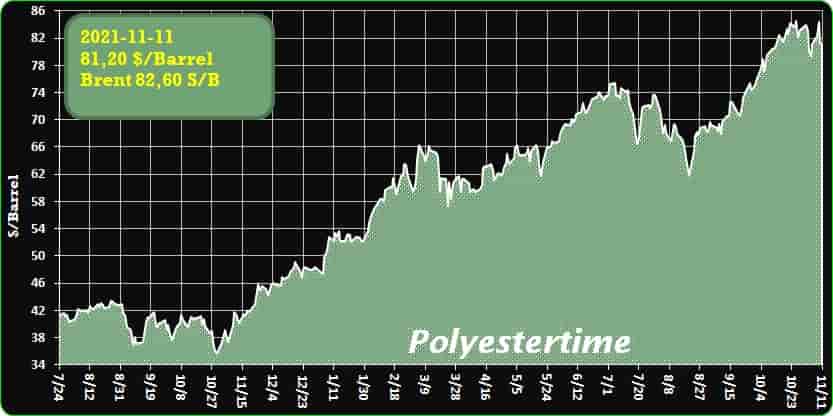
-100% Biobased PET Bottle Gets Closer to Commercialization
It’s not here quite yet, but ability to make both key PET precursor chemicals from plant-based sources is “ready for commercial scaling.”
It’s coming a little later than expected, but The Coca-Cola Company announced late last month that it is moving toward commercialization of PET beverage bottles based 100% on renewable plant sources (not including caps and labels), “using technologies that are now ready to be commercially scaled.”
No actual introduction date was announced, but a limited run of 900 prototype bottles have been produced with all-biobased PET, or bPET, as Coca-Cola calls it.
To date, the maximum biobased content in commercial PET bottles has been 30%, from monoethylene glycol (MEG) obtained from ethanol derived from plant sugar.
The first commercial PET beverage bottle utilizing biobased MEG (bMEG) was Coca-Cola’s PlantBottle, launched in 2009.
In 2011, Coca-Cola announced it had joined the race toward 100% bPET by funding two firms with different routes toward producing biobased paraxylene (bPX), the precursor for the remaining 70% of the PET polymer, purified terephthalic acid (PTA).
By mid-2015, one of those two firms, Virent, Inc. of Madison, Wis., had advanced far enough that its catalytic bioconversion technology, then still at laboratory scale of development, was used to produce the first all-biobased PlantBottle prototype.
At that time, Coca-Cola hoped to commercialize the bPET bottle by 2020.
- Coca-Cola Debuts First 100% Biobased PET Bottle
- Coca-Cola Joins Race for 100% Biobased PET Bottle
- Pepsi Develops First 100% Biobased PET Bottle
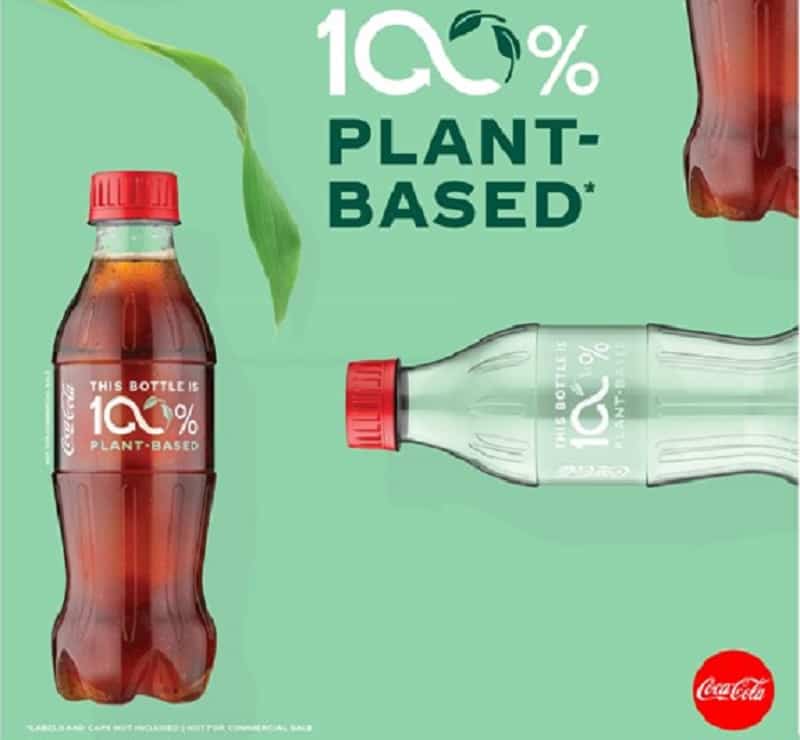
-Strategic partnership Origin Materials, Kolon aims to commercialise PEF
A new partnership announced between Origin Materials in California and Seoul, South Korea-based Kolon Industries is aimed at advancing the development and industrialisation of new, sustainable carbon-negative products based on Origin’s proprietary and patented technology platform. Kolon will bring its polymerisation expertise, application development and supply chain strength to the new collaboration.
In addition, as part of the partnership, Kolon has signed a multi-year capacity reservation agreement to purchase materials from Origin Materials.
While the initial focus will be on materials for automotive applications, the companies said the partnership includes co-development aimed at commercialising polyethylene furanoate – PEF – a novel polyester that can replace and even outperform PET on certain performance characteristics, including barrier properties, in packaging and other applications. PEF is a 100% recyclable, bio-based polymer produced using renewable raw materials -sugars- derived from plants. Kolon Industries has worked with furan resins for many years and has developed an expert knowledge of furan chemistry.
Origin Materials’ technology platform is expected to produce cost-competitive, sustainable, carbon-negative furandicarboxylic acid, known as FDCA, the primary precursor to PEF.
Working together, the companies plan to accelerate the deployment of environmentally sustainable products and create profitable, competitively advantaged business opportunities for each, they said. Biobased PEF Antiviral Battery
“Origin is a pioneer and a global leader in carbon negative chemical technology, and Kolon Industries is a world leader in chemicals and polymers,” said Sung Han, Chief Technology Officer of Kolon Group. “Therefore, the collaboration between these two companies will ensure both carbon-negative and cost-effective sustainable polymer economy.”
“This partnership reflects both companies’ commitment to sustainable innovation,” added Bissell, Co-CEO of Origin Materials.
Over the past 10 years, Origin has developed a platform for turning the carbon found in inexpensive, plentiful, non-food biomass such as sustainable wood residues into useful materials while capturing carbon in the process.
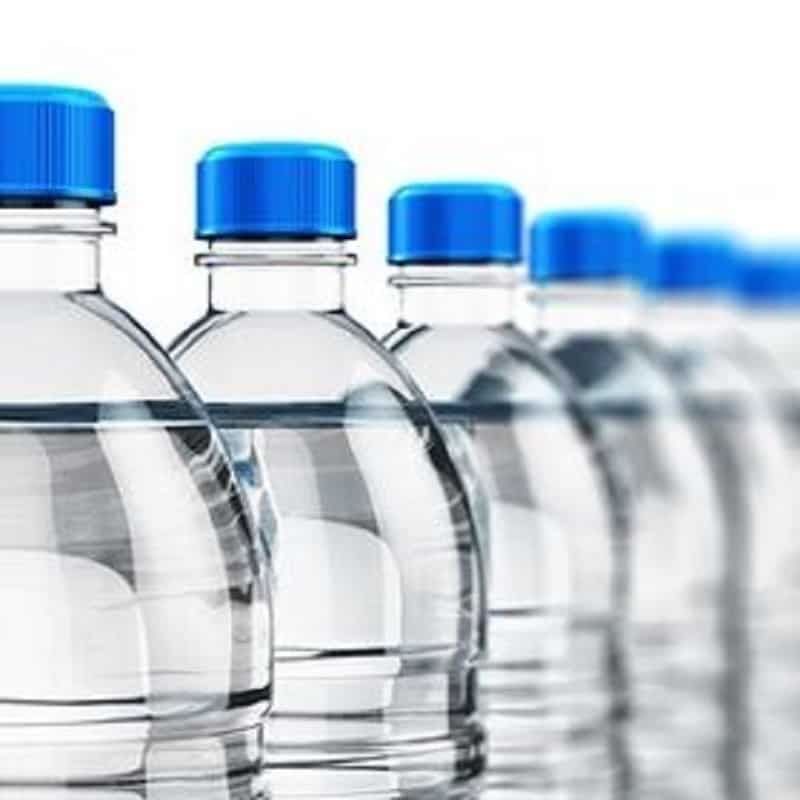
-Microban® International announces a new range of antiviral technologies
Microban International, the global leader in antimicrobial solutions, odour control and residual sanitisation/disinfection solutions, is pleased to announce a new range of antiviral technologies that are proven to reduce viral loading on products and surfaces. Microban has long been a trusted partner in a wide range of sectors – from consumer and healthcare to industrial and construction – and this announcement adds to the versatility of the company’s technology portfolio.
Microban® technology can be incorporated into various materials during manufacturing, becoming part of the product’s structure to provide inherent and enduring protection from microbes. Recent data demonstrates that new antiviral technologies from Microban conform to both ISO 18184 – which assesses the antiviral performance of treated textile products, such as woven and knitted fabrics, fibres, yarns, and braids – and ISO 21702, which measures activity in treated plastics and other non-porous surfaces. Thorough testing was performed to evaluate the efficacy of each product type against many viruses, including bacteriophage Phi6, an important surrogate virus for SARS-CoV-2. The results showed that articles treated with these technologies can now benefit from reduced viral loading* by up to 99 %.
Antiviral technologies from Microban inhibit the viruses’ ability to remain viable on surfaces. The modes of action vary, disrupting the structure of either the outer protein coat – to prevent viruses from recognising or binding to host cells – or nucleic acid payload, to prevent viral replication. This gives manufacturers a valuable product feature and provides consumers with added peace of mind.
Michael Ruby, President of Microban International, explained: “We are excited with the latest results confirming the antiviral activity of our new technologies. Assessing antiviral efficacy in treated products to a standard that meets the complex regulatory landscape is an arduous process, but we have been confident throughout that our innovative solutions conformed to the rigorous ISO standards. Biobased PEF Antiviral Battery
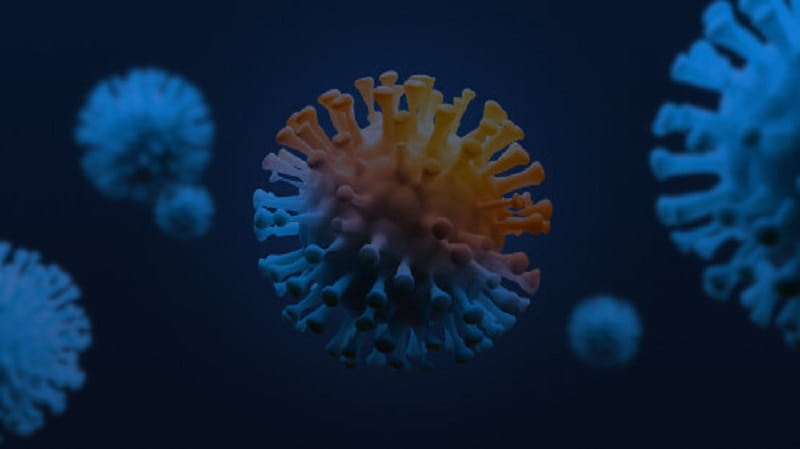
-PepsiCo, Unilever cite need for mechanical, chemical recycling to meet goals
A pair of large consumer brand companies see chemical recycling as an important component in eventually meeting their sustainability goals.
Both PepsiCo Inc. and Unilever plc, which feature some of the world’s most well-known brands and use plenty of plastic packaging, view chemical recycling as an emerging approach that still needs plenty of support to ultimately succeed.
But the companies also believe chemical recycling, sometimes called advanced recycling, as an important complement to mechanical recycling that currently dominates the plastic recycling industry.
Clarence Sequeira is senior manager sustainable materials and technology for PepsiCo global research and development.
“It should be said that mechanical recycled PET is, of course, certainly preferable. But why is that? It has 60 percent less GHG compared to virgin PET,” he said during a presentation at the recent Plastic Packaging Summit organized by the Plastics Industry Association trade group.
“But there is a problem. And the problem is that, for one, mechanical recycling can only accept feedstocks that are clean and essentially clear PET. This material is in high demand from all of the brand owner commitments,” Sequeira said during a virtual presentation.
“These are very aggressive goals and in order to accomplish that the only way possible would be to use a complimentary approach of both mechanical and chemical recycling,” he said.
Sequeira
Also some of that clean and clear PET already is diverted from the packaging industry to the textile and carpet industries. “It’s a battle to get sufficient material,” he said.
But that’s where chemical recycling can play a part.
Diverting contaminated plastics to chemical recycling facilities — material that would otherwise be thrown away — would create more recycled supply at a time when companies around the world are pledging to increase their use of reclaimed plastics.
Unilever has laid out a set of ambitious environmental goals including making all packaging reusable, recyclable or compostable by 2025. The company also will cut its use of virgin plastic in half and collect and process more plastic than is used by that date.
“Recycling is a really important part of how we will achieve our targets and our starting point is the use of mechanical recycling,” said Colin Kerr, global packaging technology director for Unilever.Biobased PEF Antiviral Battery
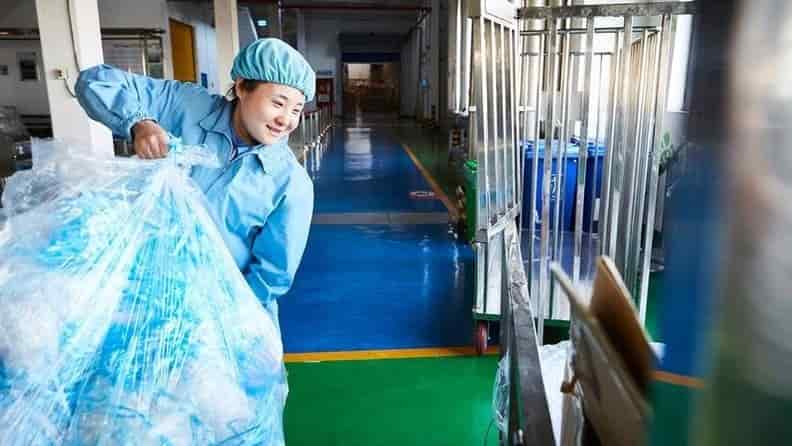
Partnership will facilitate heavy-duty battery recycling at scale asheavy duty EV adoption continues to grow
NFI Group Inc. (“NFI”), a leading independent bus and coach manufacturer and a leader in electric mass mobility solutions, today announced that it has expanded its partnership with North America’s largest lithium-ion battery recycler, Li-Cycle Corp. (“Li-Cycle”), to now offer heavy-duty electric vehicle (“EV”) battery recycling to public transit customers in North America through Li-Cycle.
The partnership builds upon successful completion of an EV battery recycling pilot program between NFI subsidiary New Flyer of America Inc. (“New Flyer”) and Li-Cycle, originally announced in January 2021. The pilot was Li-Cycle’s first program in the heavy-duty vehicle space.
Li-Cycle can now provide battery recycling for all NFI vehicles, including New Flyer, MCI, Alexander Dennis, and ARBOC. As zero-emission adoption continues to expand across North American public transit, the accumulation of end-of-life batteries will increase demand for heavy-duty battery recycling. NFI’s partnership with Li-Cycle will provide operators a viable option for battery recycling, in turn delivering full-circle sustainability.
“Since the inception of our pilot project with Li-Cycle, we have witnessed closed loop resource recovery and environmental stewardship in action – which strongly aligns with our focus on sustainability,” said Chris Stoddart, President, North American Bus and Coach, NFI. “We are optimistic about Li-Cycle’s ability to support increasing demand for battery recycling, and more importantly, to promote it as a viable alternative for recapturing precious minerals for re-entry into the supply chain. As North America’s leader in electric mass mobility solutions, it was only natural to partner with North America’s largest lithium-ion battery recycler.”
Li-Cycle offers a proprietary, closed loop lithium-ion battery resource recovery service producing minimal solid waste, and zero liquid and air emissions that can sustainably produce battery-grade lithium, nickel, and cobalt products.
Li-Cycle recovers critical materials from lithium-ion batteries and reintroduces them into the supply chain. It achieves this through 95% recovery of all lithium-ion battery materials – extracting high-grade materials for battery reproduction at a cost lower than mined and refined material. Its patented wet recycling processes battery materials hydrometallurgically, and outputs high-purity battery chemicals to be redirected to the lithium-ion battery supply chain and broader economy. In addition, Li-Cycle’s wet-chemistry process requires lower energy consumption than traditional high temperature processes and is fully sustainable, with no solid or liquid waste and zero-impact air emissions. Biobased PEF Antiviral Battery

-Raw material prices escalate across the supply chain
Indorama and Toray increases indicative of the overall market situation.
Significant shortages of the nylon 6.6 precursor adiponitrile since 2018 have caused price escalation for nylon 6.6 polymer for airbags.
The Hygiene Division of Indorama Ventures is increasing prices on all polypropylene, polyester, recycled polyester, polylactic acid (PLA) and bicomponent fibres from December 1, 2021, or as contracts allow.
These fibres are used in a variety of different hygiene and technical applications worldwide and prices will increase up to 15%, depending on the specific fibre grade.
“Due to unprecedented increases in energy, wages, domestic and international freight costs, as well as finishes, additives and all packaging materials, we find it necessary to take this pricing action,” said Shachar Rachim, CEO of the Hygiene Division. “These price increases will take place independent of any resin cost changes.”
“We recognise that these increases are taking place during an unusually high period of commodity resin pricing, yet we must take this action in order to support the staffing of our operations and the continued delivery of our high-quality fibres,” added chief marketing officer Tom Zaiser. “We will monitor the dynamic, global inflationary issues making these increases necessary on a quarterly basis and adjust as possible should these pressures subside.”
Similarly, Toray Industries, is announcing a price increase on nylon 6.6 yarns and derivative fabrics for automotive airbag applications by around 20% from December 1st.
Significant shortages of the nylon 6.6 precursor adiponitrile since 2018 have caused price escalation for nylon 6.6 polymer, as the principal material in automotive airbag yarns and fabrics. The winter storm Uri, which hit North America in February 2021, caused significant global shortages again and hampered economic activity, leading to raw material prices soaring. In addition, the prices of secondary raw materials like silicone for coating airbag fabrics have rocketed due supply shortages. Rising fuel, electricity, and logistics costs are compounding challenges in the airbag business.
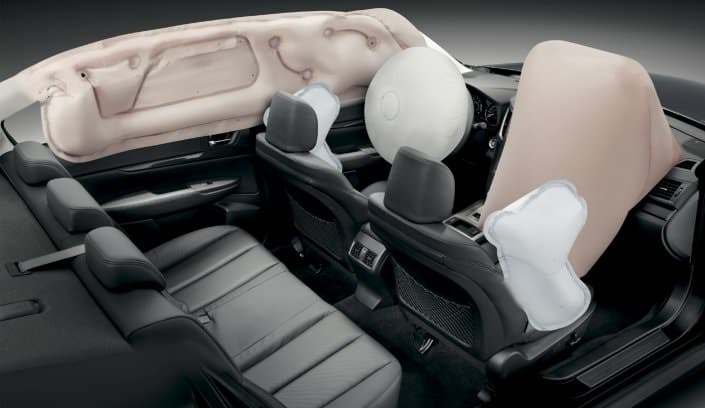
-Plastic Energy raises €145 million to drive growth, expand advanced recycling technology
Chemical recycler Plastic Energy announced today that it has completed a €145 million round of financing from three separate investors: LetterOne, Axens and M&G.
The company, which is headquartered in the UK, currently operates two plastic-to-plastic chemical recycling plants in Spain. Construction on additional plants in France and the Netherlands is underway. Plastic Energy plans to use the proceeds to accelerate its growth, to expand its technology and its global portfolio of recycling plants.
“It is encouraging to have the support of these global companies who share our vision in reducing plastic waste and have confidence in our patented and proven chemical recycling technology,” said Carlos Monreal, founder and CEO of Plastic Energy. “This investment will have a big impact, enabling us to recycle more plastics globally and build a more sustainable and circular economy.”
Plastic Energy has developed proprietary technology that enables hard-to-recycle end-of-life plastics to be recycled using a thermal anaerobic conversion (TAC) process. The output of the process, called Tacoil, is suitable for use as feedstock from which ultimately virgin-quality food-grade packaging can be produced.
Plastic Energy has a number of agreements in place with such players in the chemical sector as Sabic, TotalEnergies and ExxonMobil. Already, recycled plastic made from its process has been incorporated into packaging and products for brands such as Unilever and Tupperware.
LetterOne, a UK-based firm investing through its L1 New Energy arm, is ‘passionate about building better businesses’, said managing partner Tim Summers. “Carlos Monreal and the management team at Plastic Energy have created a pioneering company with compelling growth potential,” he said, explaining his company’s participation in the funding round.
In addition to its direct investment, France-based Axens, a company providing technologies, products, services and equipment, for the production of cleaner, renewable, gas, fuels and chemicals, has also agreed on a strategic collaboration with Plastic Energy for the worldwide marketing and licensing of Plastic Energy’s chemical recycling technology.
“Achieving a true circular economy of recycled polymers, including for food contact and health care grade, is a largely shared objective. And, leveraging Plastic Energy and Axens complementary operational and technological skills, we can now offer a combination of proven technologies to make it possible” said Stéphane Fedou, Plastic Circular Economy Director at Axens Biobased PEF Antiviral Battery
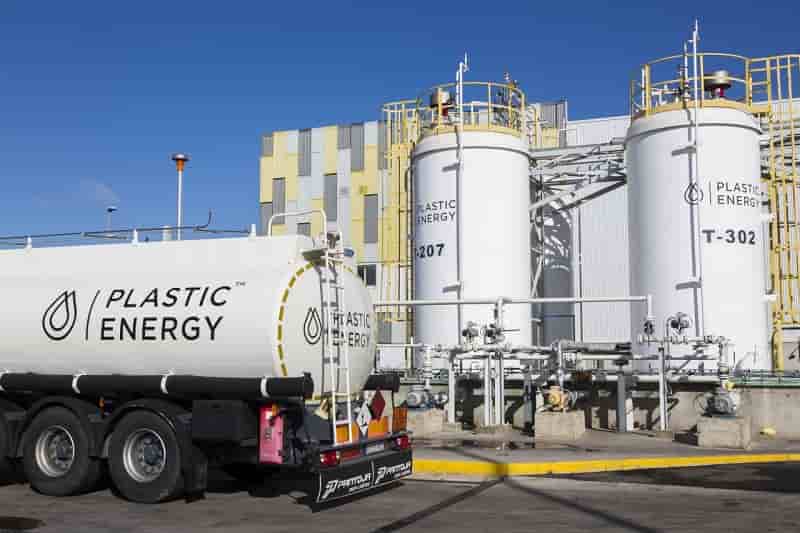
-Preventing ‘permastink’ -Breakthrough method for evaluating odour control capabilities in textiles.
Microban International is welcoming the recently approved AATCC test method – TM211-2021 – that has been developed to support the textiles industry.
The strategically important, standardised Drager method measures the reduction of odour on materials treated with antimicrobial technologies, and partners well with existing textile test methods such as the AATCC TM100, to show the correlation between bacterial reduction and odour control.
Microban was one of the early adopters of this method that can for the first time provide a truly quantitative evaluation of the valuable, real-world and functional benefits of antimicrobial chemistries by quantifying odour reduction.
Antimicrobial technologies in textiles provide a proactive solution for preventing ‘permastink’ – the enduring odours created by the metabolism of sweat by skin flora that often persist on clothes after cleaning. These odour control formulations work on the understanding that reducing the growth of microbial populations on textiles will subsequently reduce odors generated from bacterial activity.
The AATCC TM 211-2021 test method is an objective method that can articulate the efficacy of odour control technologies and provide definitive scientific evidence for these claims. Additionally, this highly sensitive test gives real-time and visual depictions of ammonia levels – created by bacterial metabolic pathways – on a colorimetric scale, in under 48 hours. The biological system can be used across the textile industry for assessing the odour capture propensity of both antimicrobial-based technologies, and other odour-reducing techniques.
“This method offers a much-needed standard for addressing odour as a factor in antibacterial finish performance,” said Erika Simmons, technical director at the AATCC. “It opens doors to innovation down the road.”
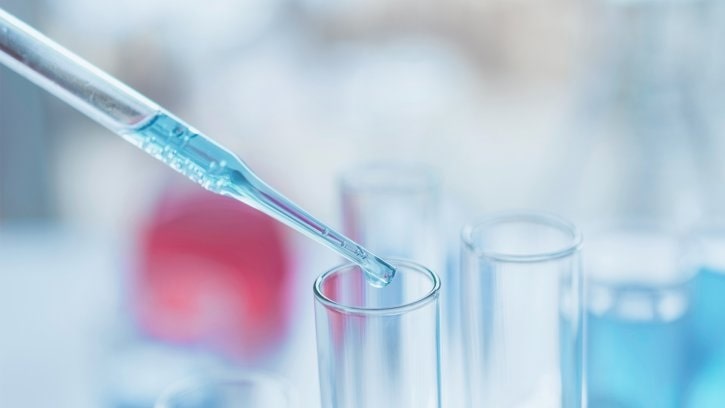
Biobased PEF Antiviral Battery
